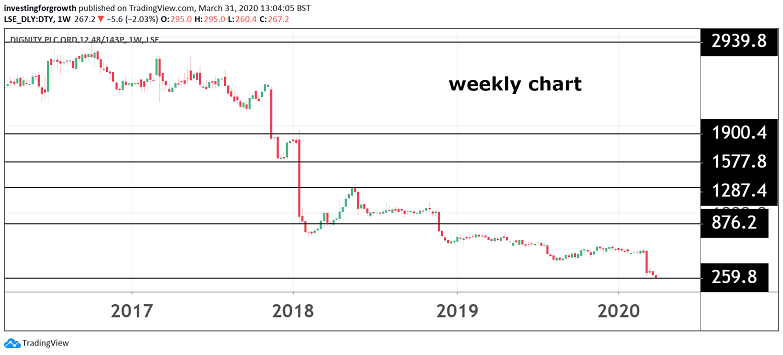Stockwatch: Betting on one of life’s certainties
It might make investors uncomfortable, but some stocks will benefit from Covid-19. Is this one of them?
31st March 2020 13:40
by Edmond Jackson from interactive investor
Share on
It might make investors uncomfortable, but some stocks will benefit from Covid-19. Is this one of them?

There are only two certainties in life, so the famous quote goes – death and taxes. Instinct would have you believe that there must now be an inevitable rise in the UK death rate following the Covid-19 outbreak. There is certainly already concern about how the public’s reaction to this coronavirus is going to mean a wider public health impact.
There is also discussion among investors, uncomfortable as it might make us feel, about which stocks might feel a benefit from the pandemic. Not to get carried away with this or ambulance-chase, but might there be a revenue boost for small-cap funerals services firm Dignity (LSE:DTY)?
Funerals continue to go ahead, albeit in some confusion as to any limit on numbers. More significantly, this may offset a draft report on the industry by Competition and Markets Authority (CMA) is due out in the next two months.
Competition and, in the last year, the threat of greater regulation, are responsible for Dignity shares having slumped from over 2,800p four years ago to a near-record low of 260p.
The table further down this article shows Dignity’s operating margin falling from over 30% during 2015-2017 to 13% last year in response to the CMA declaring a year ago it would investigate the funerals industry.

Source: TradingView Past performance is not a guide to future performance
Dignity has reacted perhaps the only way it can, saying it “provides an unparalleled opportunity to improve standards and protect customers” in a previously unregulated industry.
Lower death rate still blamed for recent profit fall
However, the 2019 results’ operating review – likewise the 2019 interims – significantly blamed a death rate around 7% lower, which is why I am attuned to the medium-term prospect that it will rise with the ebb and flow of cold winters and extremely hot summers.
Dignity did well only to see a 5% revenue decline to £301.3 million, although, as management implements a thorough transformation plan, operating profit fell 21% and pre-tax profit by 31% to £37.7 million. I feel there is a bit of externalising blame to the death rate, when Dignity has had to take actions to be competitive versus price-discounters, and margins are down before we see the CMA’s report. No insiders have bought shares since Dignity came out of its closed period on 11 March.
Poor financial risk rating also weighs
Manifestly, having omitted both the interim and final dividend, the board signals difficult times. The 2019 cashflow statement shows net cash from operations more than halved to £32.2 million, while the income statement has net finance costs of £25.6 million (similar to 2018) versus £44.8 million operating profit.
The bulk of debt is very long-term – stretching to 2049 for example – however, its cost relative to reduced profit/cashflow likely explains why Dignity has an Altman Z2 score of -0.21, indicating a serious risk of financial distress in the next two years. My sense is that this relates to an EBITDA covenant of a minimum 1.5x on a key chunk of debt, whereas 2019 operating profit cover was 1.75x net interest. Give or take a bit, for proper comparison, but it’s getting close.
Credit ratings tend to be backward-looking, but a key question is how revenues pan out for the next two years. Conceivably, they can improve. The death rate is one significant variable according both to virus-related fatalities and other health shocks.
Also, the CMA has ultimately to ensure the funeral industry can function capably, i.e. earn meaningful profits in order to invest in facilities etc. Hence, publication of its report might clear the air.
| Dignity - financial summary | ||||||
|---|---|---|---|---|---|---|
| year ended 27 Dec | 2014 | 2015 | 2016 | 2017 | 2018 | 2019 |
| Turnover (£ million) | 269 | 305 | 314 | 324 | 354 | 339 |
| Operating margin (%) | -15.6 | 31.1 | 31.0 | 30.1 | 21.5 | 13.2 |
| Operating profit (£m) | -41.9 | 94.9 | 97.1 | 97.6 | 75.9 | 44.8 |
| Net profit (£m) | -55.0 | 56.9 | 57.2 | 57.8 | -17.0 | 34.9 |
| EPS - reported (p) | -113 | 115 | 115 | 116 | -34.0 | 69.8 |
| EPS - normalised (p) | 94.9 | 115 | 120 | 126 | -27.6 | 99.6 |
| Price/earnings ratio (x) | 3.0 | |||||
| Operating cashflow/share (p) | 138 | 186 | 163 | 150 | 135 | 64.4 |
| Capital expenditure/share (p) | 35.5 | 40.0 | 45.7 | 54.0 | 50.0 | 36.6 |
| Free cashflow/share (p) | 103 | 146 | 117 | 96.0 | 85.0 | 27.8 |
| Dividends per share (p) | 19.5 | 21.5 | 23.6 | 24.4 | 24.4 | |
| Covered by earnings (x) | -5.8 | 5.3 | 4.9 | 4.7 | -1.4 | |
| Cash (£m) | 86.5 | 81.9 | 66.8 | 49.0 | 80.7 | 73.4 |
| Net debt (£m) | 524 | 521 | 524 | 517 | 481 | 479 |
| Net assets (£m) | -92.5 | -43.9 | -3.5 | 46.4 | -164 | -137 |
| Net assets per share (p) | -205 | -88.8 | -7.0 | 92.9 | -328 | -274 |
| Source: historic Company REFS and company accounts |
Time for speculators at least, to pay attention
Dignity is therefore a speculative not investment grade stock, but for traders able to grasp the company’s variables, it is pertinent to watch what unfolds. In raw earnings terms, and on the basis of consensus for normalised earnings per share (EPS) halving this year to about 47p, remaining about same for 2021, the prospective price/earnings (PE) ratio is sub 6x.
Presently, that is justified given the stock’s financial risks and also the CMA uncertainty, but revenue/profit could turn out better than forecast and mitigate worries over Dignity’s finances. Doubtless the stock is at a low for this century, significantly due to capital flight from swollen balance sheets.
It is pre-arranged funeral plans that skew Dignity’s balance sheet. At end-2019 it had £542 million long-term financial liabilities, with short-term sub-£10 million, however there’s also a whopping £1.2 billion contract liabilities – classed as deferred revenue, note 9 clarifies as amounts received from pre-arranged funeral plans where Dignity has yet to provide such service.
Covid-19 related deaths may not prove huge
Epidemiologists’ numbers are all over the place, with different models being reported. But even Neil Ferguson, heading the Imperial College London studies most influential on our government, appears to have downgraded fears from half a million deaths a week or so ago, to a final tally of “less than 7,000”, asserting that diverted/expanded NHS resources should be able to cope. This is in context of circa 20,000 variability around 600,000 annual UK deaths.
So, it would be reckless to buy Dignity chiefly as a Covid-19 play, but justified to consider it as weighing up other dynamics.
Social distancing rules are also less critical
Possibly June could see some lifting of lockdown in the UK, but we have no idea whether this will be on-and-off, according to new infections/hospitalisations. Yet, having organised a funeral myself some years ago, through a provider that’s now owned by Dignity, my recollection is the number of people attending not actually being material to the overall cost – unless you are factoring in a paid-for reception afterwards. Funerals and the associated costs of death must still go ahead.
Gamblers may therefore get lucky buying into Dignity now – potentially at a point of maximum uncertainty – despite forecasting being truly elusive. The stock is off-limits for ISAs and SIPPs, lest things get even worse due to financial risks, and you can’t utilise a tax loss. Yet, in the collateral damage of lockdown, funeral service providers are a business able to thrive through the uncertainty – and be well-positioned afterwards, having adjusted to regulatory demands.
A balanced approach is to wait for the CMA report - with the caveat how simply removing uncertainty may be more crucial for sentiment now. On current evidence, existing holders have reasons to keep the faith, thus overall: Hold.
Edmond Jackson is a freelance contributor and not a direct employee of interactive investor.
These articles are provided for information purposes only. Occasionally, an opinion about whether to buy or sell a specific investment may be provided by third parties. The content is not intended to be a personal recommendation to buy or sell any financial instrument or product, or to adopt any investment strategy as it is not provided based on an assessment of your investing knowledge and experience, your financial situation or your investment objectives. The value of your investments, and the income derived from them, may go down as well as up. You may not get back all the money that you invest. The investments referred to in this article may not be suitable for all investors, and if in doubt, an investor should seek advice from a qualified investment adviser.
Full performance can be found on the company or index summary page on the interactive investor website. Simply click on the company's or index name highlighted in the article.
Disclosure
We use a combination of fundamental and technical analysis in forming our view as to the valuation and prospects of an investment. Where relevant we have set out those particular matters we think are important in the above article, but further detail can be found here.
Please note that our article on this investment should not be considered to be a regular publication.
Details of all recommendations issued by ii during the previous 12-month period can be found here.
ii adheres to a strict code of conduct. Contributors may hold shares or have other interests in companies included in these portfolios, which could create a conflict of interests. Contributors intending to write about any financial instruments in which they have an interest are required to disclose such interest to ii and in the article itself. ii will at all times consider whether such interest impairs the objectivity of the recommendation.
In addition, individuals involved in the production of investment articles are subject to a personal account dealing restriction, which prevents them from placing a transaction in the specified instrument(s) for a period before and for five working days after such publication. This is to avoid personal interests conflicting with the interests of the recipients of those investment articles.